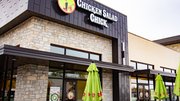Commentary
Who is winning the UK burger wars?
In the UK, the premium burger category straddles the fast casual and casual dining segments, but regardless of how you slice it, competition in the category is very high indeed.

October 9, 2018
By Abe Matamoros, Capdesia
The premium burger category in the UK straddles the fast casual and casual dining segments, but regardless of how you slice it, competition in the category is very high. Shake Shack and Five Guys, for example, arrived in Europe the same week during the summer of 2013. To be precise, Five Guys beat Shake Shack to the UK opening by one day. Fast forward five years, and there are nine Shake Shack units in the UK versus a very commendable 90+ Five Guys. Five Guys even found the time to open in France, Spain and Germany in that time, which would take them to over 100 units total in Europe today. Impressive indeed.
For the arriving Americans, it was not to be an easy conquest. Lying in wait were two main local players, which had already introduced the British public to gourmet burgers and both had a respectable lead by the time the Americans landed in London five years ago: Gourmet Burger Kitchen (Est. 2001) and Byron (Est. 2007), with the former, eventually reaching 90+ units today and the latter peaking at 69 locations. Byron, which actually offers a full-service experience, is in trouble, however, and although GBK is under new ownership and management, it's facing a changed landscape. And to top it off, there's the next wave of exciting new concepts already emerging, like in the specialty coffee wars, where irrepressible start-ups like Honest (Est. 2011, 26 sites today) and Patty & Bun (First site in 2012, eight sites and a truck) are elbowing their way in and grabbing market share.
Across the channel, the premium burger market is running a bit behind in comparison, but local start-ups are sprouting everywhere and some showing great promise. Big Fernand and Le camion qui fume in France, Otto (Hamburg) and Schiller (Berlin) in Germany, Ellis in Belgium, Burgermeester in Holland, and Goiko Grill and Bacoa in Spain represent that new wave. Competition is not as high in the continent today as it was the case in London five years ago, so it's no surprise that after their success in the UK, Five Guys has already set sail across the channel to walk through that open door.
Here in the UK, the race between these two popular American players is producing two drastically different outcomes: one success and one failure?
Some people believe restaurant expansion is all about having the right cookie cutter approach. I beg to differ, at least when it comes to the international expansion journey. There are probably eight to 10 critical elements you'd have to get right to execute international well and deciding on the right market entry strategy and selecting the right partner (if that's the way you choose to go) are very close to the top of the list. I'd like to use this example to put some colour on both.
Right entry strategy and partner
Anyone who's tried to find the right partner to enter the UK market knows how difficult it is. The ready-made, multi-brand operating platforms found in the Middle East, and other countries, which collect foreign brands don't really exist in the UK, so one has to be rather creative. Existing multi-brand operators in the UK mainly create (or copy) and run their own brands. "Why pay royalties," the thinking goes. I'd say France and Germany are very similar, both equally difficult to enter in their own way.
The choice
Six years ago, I very much doubt that Sir Charles Dunstone would have made anyone's list of potential partners for the UK, but here we are. He was the not-so-obvious choice, actually, he wasn't even a choice. Perhaps not surprisingly, it was Sir Charles, who reached out to Five Guys and not the other way around. Today, he probably tops the list of potential partners in the UK but back then had no restaurant experience. Five Guys saw the potential. He was a local with a record of business success, which always helps, and possessed two clear advantages. Through his CarPhone Warehouse retail experience, he had a team well-versed in scaling up and multi-site management and had negotiated more leases than many large restaurant companies in the UK, including QSR concepts. His company knows the UK property market intimately, and this is a key advantage. He also has deep pockets which never hurts. Plus, it goes without saying, he knew how to build a high-performing team.
Shake Shack, on the other hand, opted to franchise the UK to their existing Middle Eastern partner, the Alshaya Group, based in Kuwait and with whom they have already successfully expanded to other countries in the Middle East, Turkey and Russia. Without a doubt, if you're looking to franchise in the Middle East, Alshaya is Top 2 at the very least. The last time I counted, Shake Shack had 68 units internationally, and 51 of those were with the Alshaya Group (including the nine in the UK). I wonder how long Shake Shack tried to find another UK partner or if it ever did. When Shake Shack famously went public in early 2015, their international success story rode exclusively on the shoulders of its single franchise partner 6,000 miles away so this probably explains why the leadership team eventually took the decision to partner with Alshaya in the UK.
The journey
When their UK efforts started, both burger brands were relatively new to the international arena. I suspect that both UK companies set up to lead the way were very well-funded and definitely not lacking ambition. Both very likely had and have tremendous support from their motherships back in the US, and both likely built great teams.
How they both went about executing their development strategies could not have been more different. Where one can say that Shake Shack's development strategy has been conservative and even timid, Five Guys UK went all out. It reminds me of when Tim Horton's landed in Dubai back in 2006, or so. Back in Covent Garden, though, the risk taken on the first Five Guys site was bold, sublimely reckless, really. But it worked, and it has ever since, seemingly. Average restaurant sales in the UK are three to four times the US average. And it's hard to tell who has been more surprised with results to date, the team in the UK or the Murrell family back in the states. A very nice surprise though.
Alshaya, on the other hand, is not as experienced in the UK market and definitely not as well entrenched. It had some fashion retail presence in the UK in the past. It brought PinkBerry to London in 2011, but that didn't end so well. Their massive expertise in the Middle East has yet to translate, it seems. The company also runs the business from the Middle East, which is the equivalent of a franchisee embarking on international expansion themselves. The learning curve is steep. To its credit, however, as mentioned previously, it has been successful with taking its portfolio of brands to Russia and Turkey, but the UK has definitely proven to be a more difficult nut to crack.
At the same time, it's quite possible that Shake Shack and the Alshaya Group don't feel that they are in a race with Five Guys and are actually quite happy with their progress to date. It is quite possible that they did plan for 10 units in five years and maybe fell one short. I doubt it though because market share really matters in this game. Scale gets you to break even faster, provides the cash flow to manage and grow the business, produces economies of scale, helps to establish the brand more broadly, makes you convenient to the customer and much more.
On the other side, Five Guys UK now knows what scale feels like, and I bet it feels good. But honestly, if it had announced the opening of 100 units in the same period back in 2013, the company would have been laughed out of the room. Few brands can pull this off.
Cloud in the horizon?
Interestingly as well, in the longer term, there's (or was) at least one other significant difference between the two brands that would've come into play: the breadth of the menu and flexibility around it. Five Guys has traditionally had a very narrow menu and preferred to keep it that way, the In-N-Out of the East coast. Apparently, it took a gargantuan effort for the UK team to convince Jerry Murrell to allow milkshakes, which the company eventually also introduced in the US. Beef burgers, fries and hotdogs, that was it. Although sandwiches were also introduced and most recently even breakfast in the UK was tested. It seems the UK tail is wagging the dog.
Innovation and flexibility, which is normally the main fuel of comps (LfLs), is something that should continue to elevate Shake Shack. At Five Guys, unless it changes tack and it seems to be doing so, the opposite would be true. In its previous trajectory, the honeymoon per restaurant would be over at some point and maintaining sales would become a struggle in years four, five and beyond. Perhaps they were experiencing that already. When your sales are stratospheric, you can afford any rent, but if rents goes up and sales go down, as expected, I could see grey clouds ahead. Shake Shack, I'd argue, is better positioned in this regard, but Five Guys now seems to be changing its stripes. Time will tell.
Can a winner really be declared?
Yes and not yet.
It is clear that the winner in the first five years has been Five Guys. Byron, the fading local burger concept, and many others would likely agree. But this is not the end of the story. Alshaya is not a company to be counted out, and Danny Myers and Randy Garutti are used to succeeding back in the US. So I'd say that although Five Guys is winning at the 5-year mark, we still have to see how things pan out in the long term.
I would expect Shake Shack to get it right in the UK eventually and to actually benefit from being a newcomer. Customers today are not very loyal, and they're forever looking for the next big/better thing. At least in the UK, Shake Shack is still relatively new because it's difficult to find. I'd expect that in the future there will never be as many Shacks as Five Guys in the UK, far from it, but eventually the former may actually own a respectable share of the market.
On the continent, for the next five years, the sure bet would still be on Five Guys because of first mover advantage and early success, and Shake Shack doesn't even appear to have decided whether to fly, sail or take the train to get there. One would expect Five Guys to soar high in Europe, except (big pause) … for its entry strategy, where it has decided not to do it themselves or join forces with local operators but to partner with Sir Charles again. Can he get the job done once more? Got to love the twists in this developing story.
And back to the subject of restaurant chain expansion, this is a classic example of how difficult it can be to get international expansion right. When it comes to entry strategy and partner selection, amongst the many other things involved, there's certainly no cookie cutter approach, but these two factors alone can make all the difference between success, delayed success and failure.
So some key takeaways on international expansion:
- Choose the right entry strategy and partner, easier said than done (obviously).
- Local expertise is critical.
- Land properly by resourcing to match your ambition.
- Push at the right pace because small effort usually equals small results.
- And scale does matter.
Abe Matamoros is a restaurant chain expansion expert who has the occasional strong urge to share his opinions on the restaurant space. When not writing or helping operators grow their brands, he's part of an investment group called Capdesia, which provides growth capital and expertise to the next generation of limited service and casual dining restaurant chains. He resides in London with his family. If you've enjoyed reading this post, earlier ones on restaurant chain expansion and other super interesting subjects can be accessed through hislinkedinprofile.
cover photo: LinkedIn
 ChatGPT
ChatGPT Grok
Grok Perplexity
Perplexity Claude
Claude












